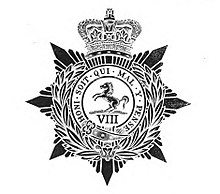| 8th (King's) Regiment of Foot | |
|---|---|
 Cap badge of the 8th (The King's) Regiment of Foot | |
| Active | 19 June 1685 – 1 July 1881 |
| Country |
|
| Branch | Army |
| Type | Line Infantry |
| Size | Two battalions |
| Regimental Depot | Peninsula Barracks, Warrington |
| Nickname(s) | The Leather Hats, The King's Hanoverian White Horse |
| Motto(s) | Nec Aspera Terrent (Difficulties be Damned) |
| Colours | Blue |
| March | Here's to the Girl |
| Anniversaries | Blenheim (13 August) Delhi (14 September) |
| Battle honours | Blenheim, Ramillies, Oudenarde, Malplaquet, Dettingen, Martinique 1809, Niagara, Delhi 1857, Lucknow, Peiwar Kotal |
| Commanders | |
| Colonel of the Regiment | General Thomas Gerrard Ball (1861–1881) |
The 8th (King's) Regiment of Foot, also referred to in short as the 8th Foot and the King's, was an infantry regiment of the British Army, formed in 1685 and retitled the King's (Liverpool Regiment) on 1 July 1881.
As infantry of the line, the 8th (King's) peacetime responsibilities included service overseas in garrisons ranging from British North America, the Ionian Islands, India, and the British West Indies. The duration of these deployments varied considerably, sometimes exceeding a decade; its first tour of North America began in 1768 and ended in 1785.
The regiment served in numerous conflicts during its existence, notably in the wars with France that dominated the 18th and 19th centuries, the American Revolution, the War of 1812, and the Indian rebellion of 1857 (historically referred to as the "Indian Mutiny" by Britain). As a consequence of Childers reforms, the 8th became the King's (Liverpool Regiment). A pre-existing affiliation with the city had derived from its depot being situated in Liverpool from 1873 because of the earlier Cardwell reforms.